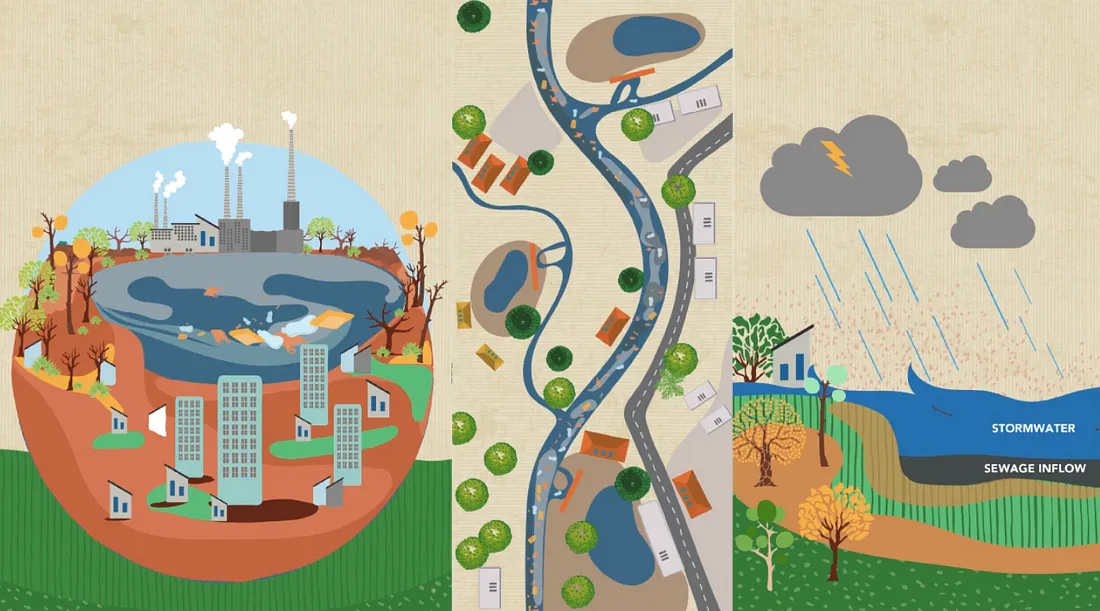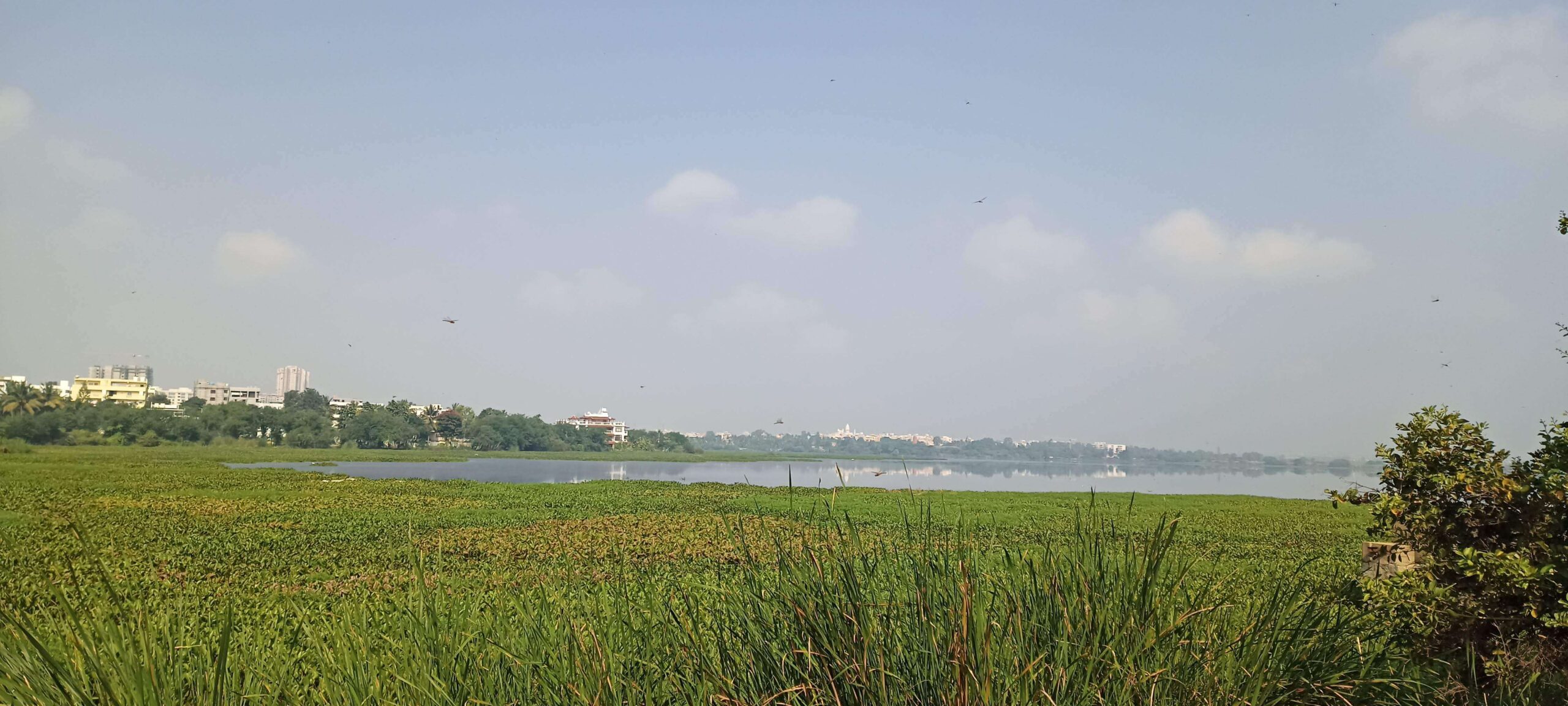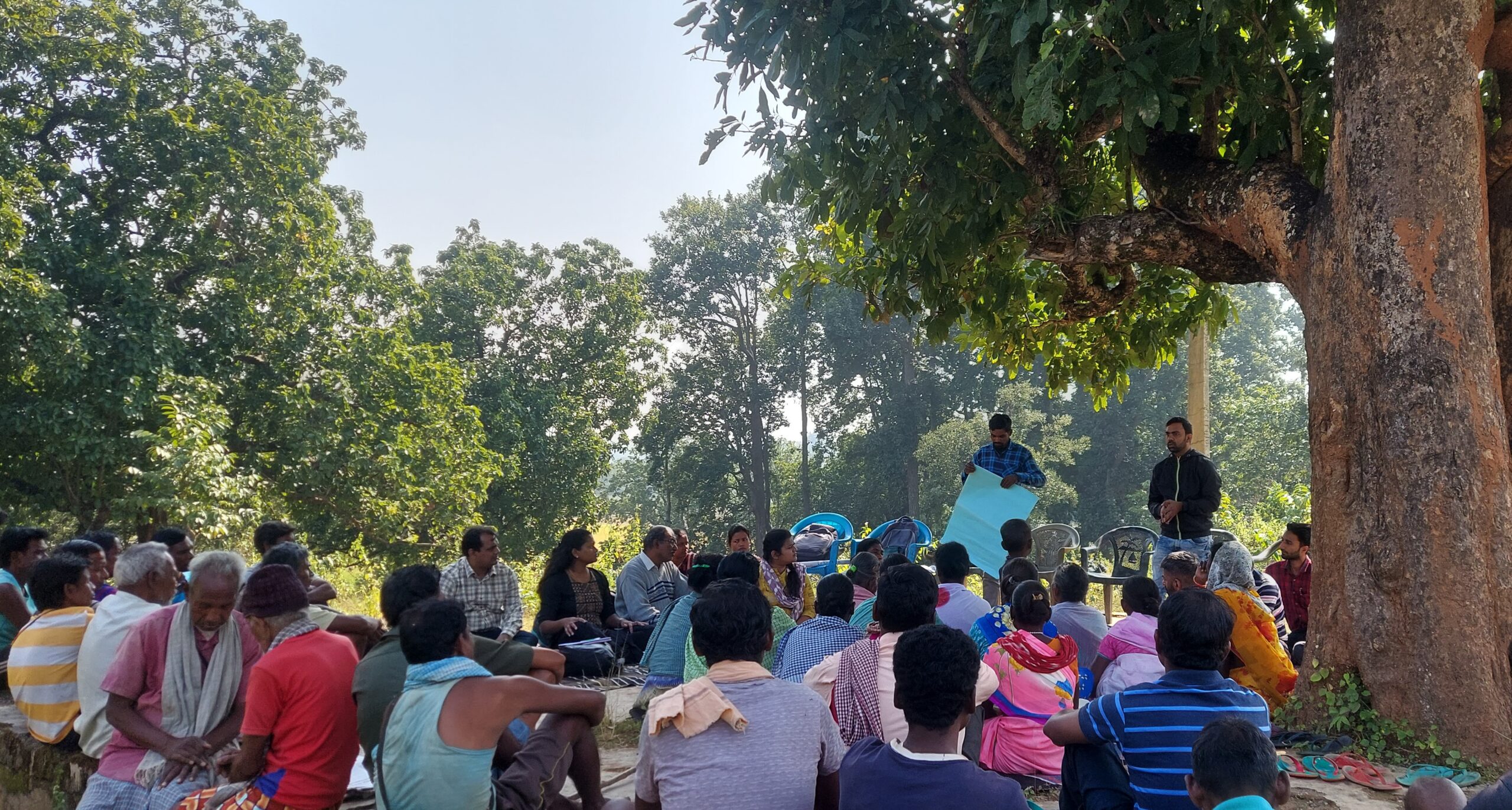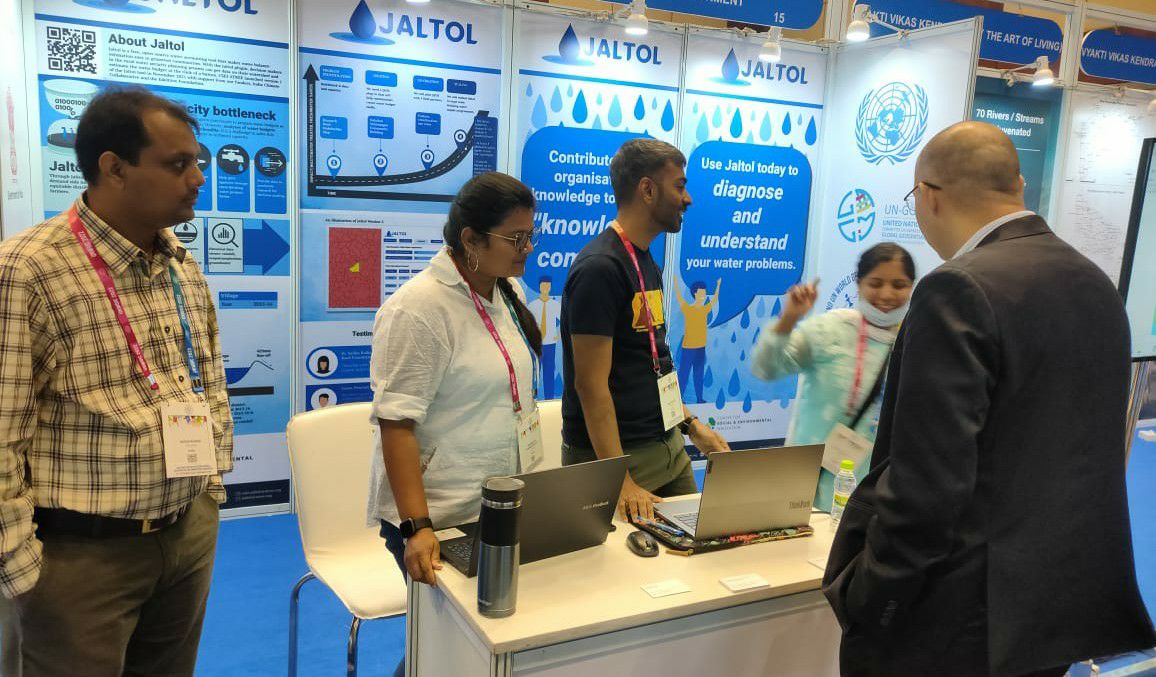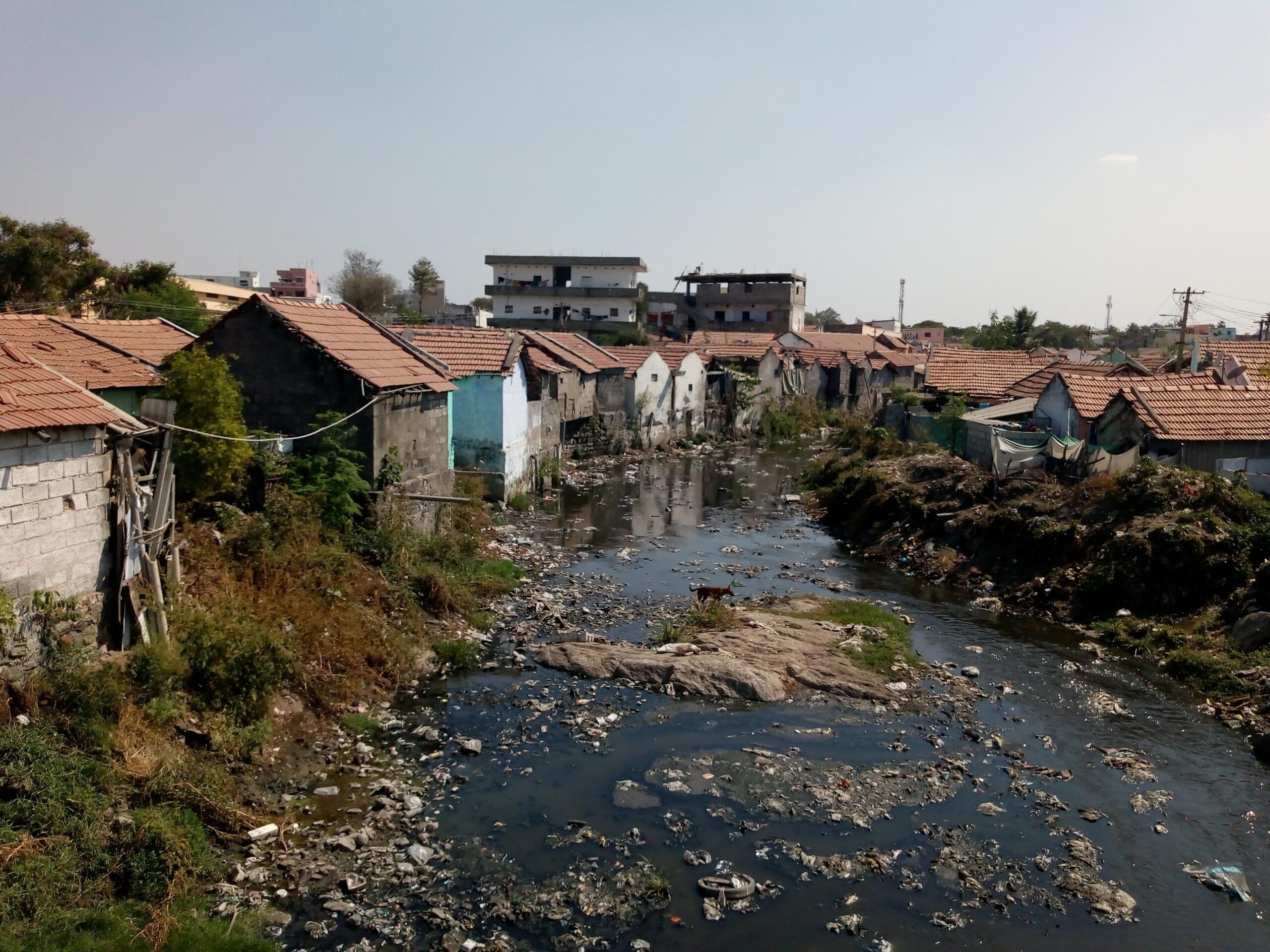Wastewater Conference: Turning Bengaluru into the ‘Silicon Valley for Water Innovation’
At the event, WELL Labs launched a report on Bengaluru’s urban water balance. Through hydrological models and secondary research, the centre has quantified the flows and stores of water in the city.
India’s tech capital is uniquely positioned to take the lead on wastewater management in India and globally, said speakers at a conference in Bengaluru on ‘Building Water-Resilient Cities Strategies for Wastewater Reuse in Urban India’. The wide ranging discussions focused on barriers that prevent the treatment and reuse of wastewater – seen as an important alternative to freshwater at a time when cities grapple with water pollution and depleting groundwater.
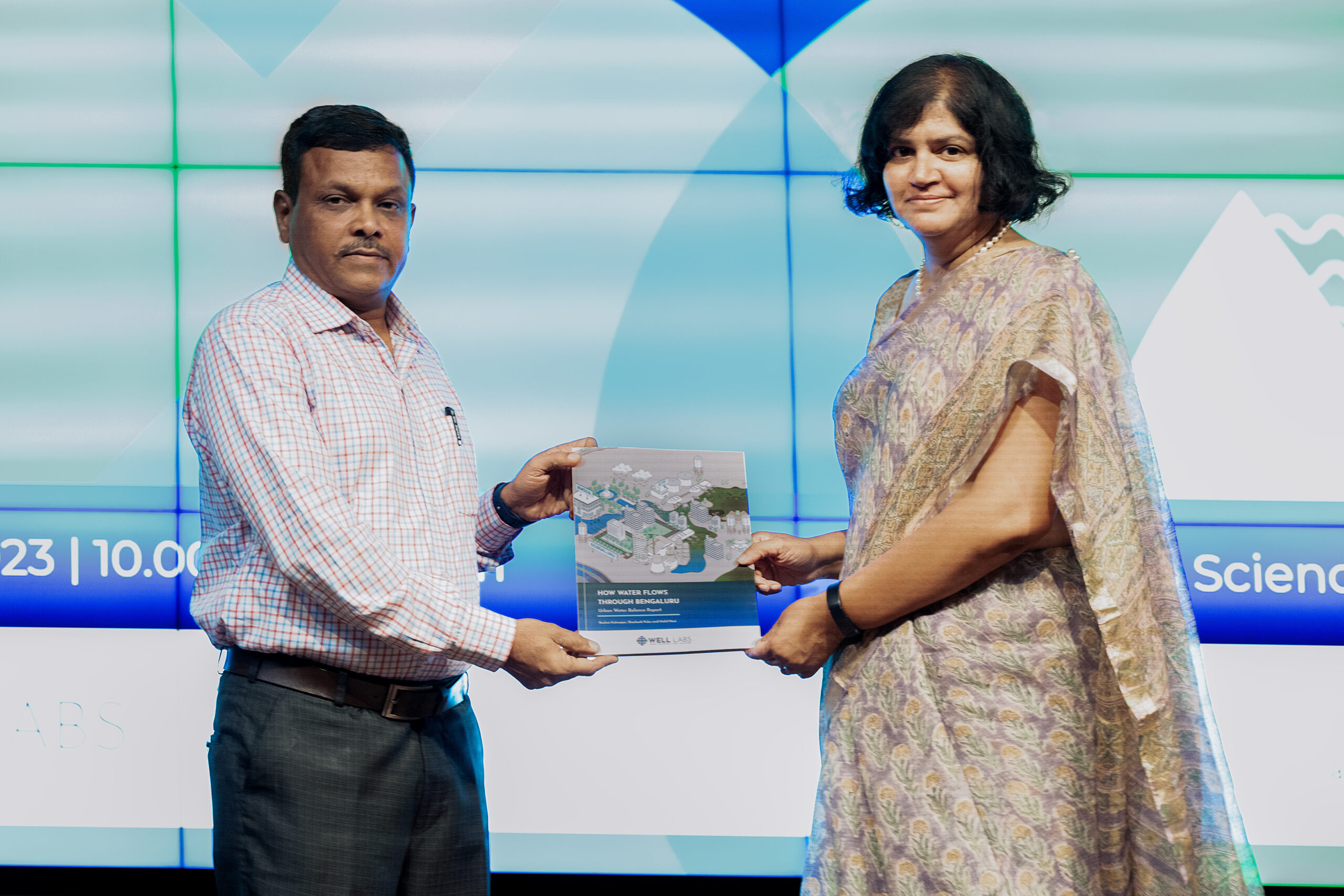
Shri BP Ravi, IFS, receives a copy of the Bengaluru water balance report from WELL Labs Executive Director, Dr Veena Srinivasan.
The conference was organised by WELL Labs along with the Swiss Federal Institute of Aquatic Science and Technology (EAWAG), and the Bangalore Apartments’ Federation (BAF), at the Infosys Science Foundation in Bengaluru on October 17.
Shri BP Ravi, IFS, Principal Secretary, Forests and Ecology, Government of Karnataka, inaugurated the event and launched the report on Bengaluru’s water balance by WELL Labs.
‘We need to reflect on utilising sewage water the best way,’ he said, stressing on the need to curb pollution of water bodies in the city.
He also talked about spurring change at the individual and community levels to ensure that Bengaluru moves towards more sustainable pathways.
Bengaluru is poised to be a global reference point for wastewater reuse.
In his keynote address, Dr Christian Binz, group leader in the cluster Sustainable Transitions and Business Innovations (CIRUS) at the Department of Environmental Social Sciences at EAWAG, explained how on-site treatment plants are gaining in popularity in water-scarce cities around the world and described Bengaluru as poised to become a global reference point.
‘For one, Bengaluru cannot afford to ramp up water extraction from the Cauvery river or groundwater. Wastewater reuse is the only reliable and ‘untapped’ water source and the city cannot grow without making wastewater reuse work. Second, there are unique innovations emerging in the city, such as platforms connecting STP vendors and builders.
These factors make Bengaluru a location where unique wastewater treatment models could be implemented on a larger scale – a ‘silicon valley for water innovation’.’
Based on how other sectors have responded to innovations like the energy sector to renewables and transport to electric mobility, the problem with implementation is not with the technology itself, rather the context or the ‘innovation ecosystem’, said Dr Binz. Legal and regulatory frameworks, industry and market structures, and investments are key factors that drive the uptake of new systems. Further factors include building knowledge skills and capacity (among operators and builders), legitimacy and trust, and sustainability and equity.
Read | How Water Flows Through Bengaluru: Urban Water Balance Report
He added that Bengaluru excels in terms of business models and the entrepreneurship part of the story. There is, however, a need to build coalitions to work towards a shared vision of water security in the city.
Despite favourable conditions in Bengaluru, there are issues that persist.
Panellists represented different sectors – residents’ welfare associations, government bodies like the Karnataka State Pollution Control Board (KSPCB) and the Bangalore Water Supply and Sewerage Board (BWSSB), start-ups and real estate developers. As a result, multiple aspects of water management were raised.
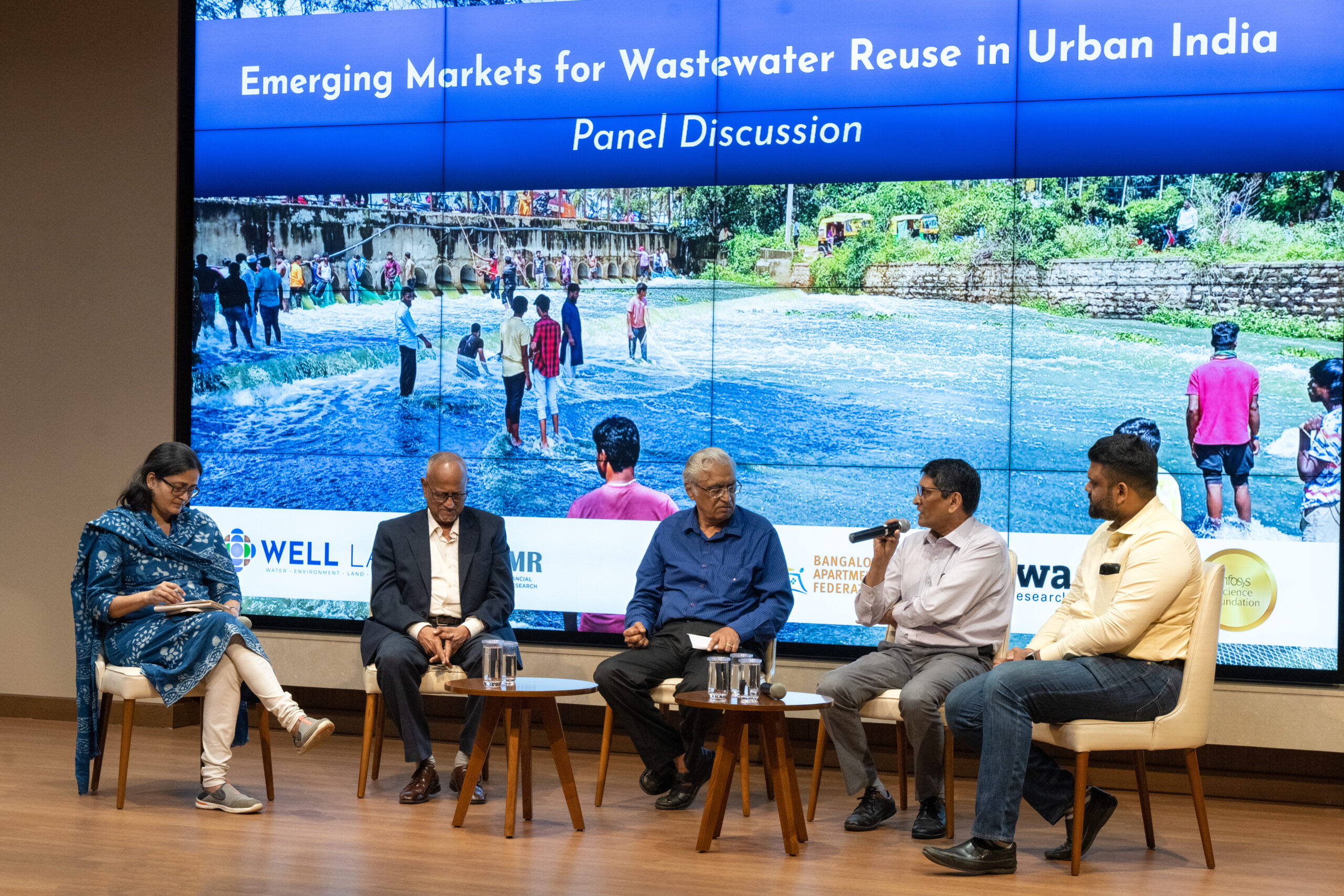
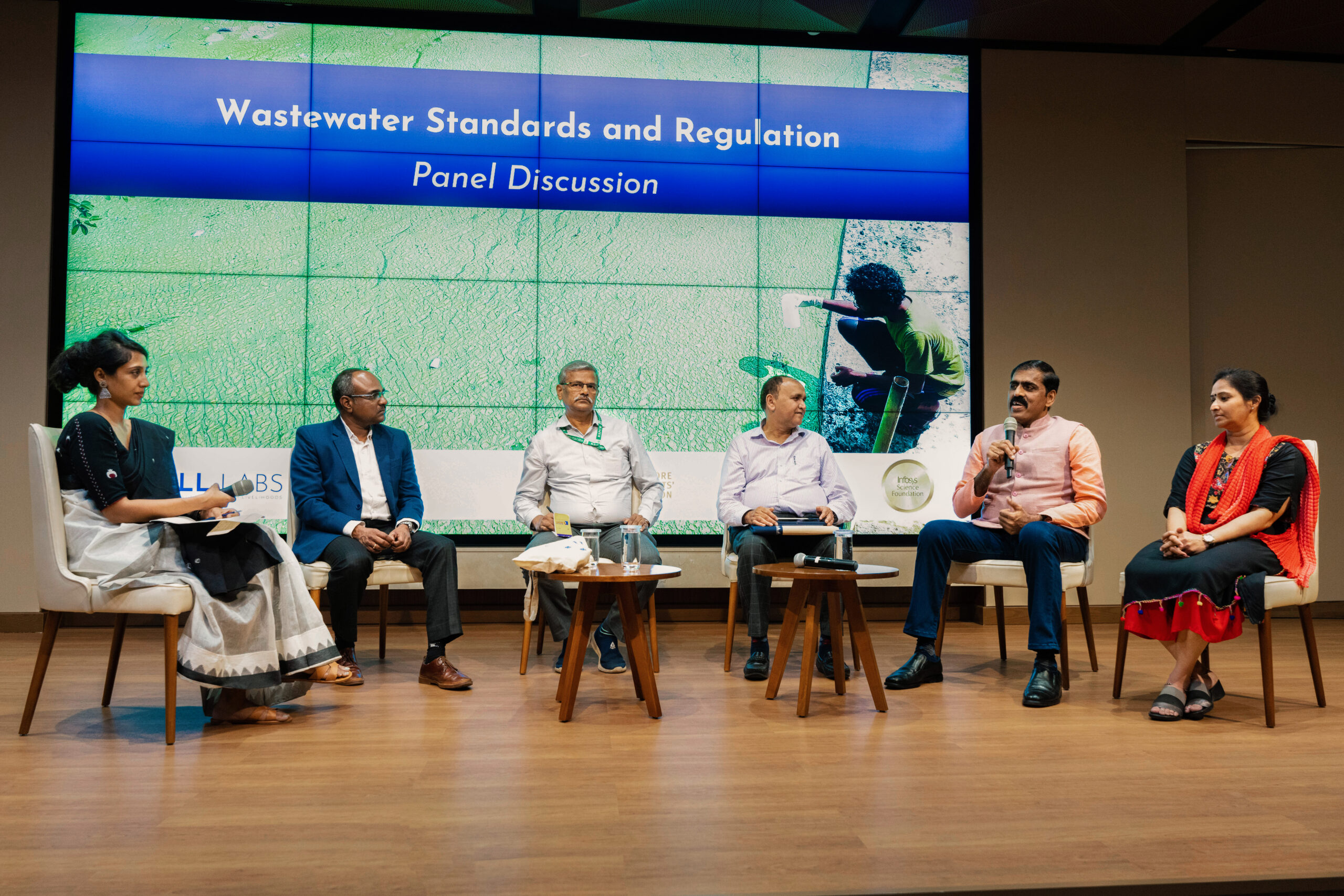
Left: Founder of Citizen Matters, Meera K, leads a panel discussion on markets for wastewater reused with Dr Ananth Kodavasal, Mr Satish Mallya, Mr Suhail Rahman. Right: Urban Water programme lead, Ms Shreya Nath, lead a panel discussion on wastewater standards and reuse with Mr Aditya Rao, Shri Mahesh T, Dr Inayathulla M, Mr M Selvarasu, Dr Shubha Avinash at the Infosys Science Foundation on October 17.
The key takeaways spanned from specific suggestions such as having the BWSSB regulate decentralised sewage treatment plants as the PCB is overburdened with monitoring the industrial sector. Larger concerns around creating standards for wastewater reuse and improving training for sewage treatment plant (STP) operators were also reiterated.
We summarise the panel discussions here:
Planning and Implementing Effective Water Management | Panellists: Prof. V Srinivas Chary, Mr Eli Cohen, Shri Prasanta Mohapatra, Mr Vikram Rai, Dr DN Ravi Shankar. Moderated by Dr Veena Srinivasan
Bengaluru is unique because there are policies in place that mandate the setting up of on-site decentralised STPs to supplement the network of state-run centralised plants. This is more sustainable in the long run than pumping water from the Cauvery river, about 90 kilometres away and up an elevation, said Dr. DN Ravi Shanker, who serves as a technical advisor on water recycling to various government departments.
The government’s Zero Liquid Discharge (ZLD) mandate, which requires apartments to use all treated wastewater within their premises, was a knee-jerk response, said Mr Vikram Rai, General Secretary of BAF. While the approach has promise, it was not carried out well because the necessary infrastructure and standards for wastewater reuse were not in place.
An economic incentive to reuse wastewater is a viable way of unlocking unwillingness among residents, he added.
Watch the full conference | Building Water-Resilient Cities: Strategies for Wastewater Reuse in Urban India
Bhubaneswar is another city that faces similar problems as Bengaluru in terms of wastewater generation and pollution of water bodies. The city is scaling up greywater management by placing great emphasis on community participation, said Prasanta Kumar Mohapatra is the Engineer-in-Chief of the Odisha Water Supply and Sewerage Board.
Accountability at each step is crucial.
The success of on-site treatment systems lies in ensuring accountability at multiple stages. This includes standardising the technology, how it is set up, the presence of empanelled trained professionals to carry out installation and third-party monitoring. This point was brought forth by Prof. V. Srinivas Chary, Director, Centre for Urban Governance, Environment, Energy and Infrastructure Development at Administrative Staff College of India.
He added that regulatory frameworks are weak, but despite this, both Bengaluru’s civil society and builders were to be credited for attempting to set up robust wastewater treatment systems. This must be strengthened. Given that the state Pollution Control Board has to monitor industries as well, is it important to consider delegating the responsibility of monitoring decentralised STPs to the BWSSB, said Prof. Chary.
Find more information about the panellists here.
Emerging Markets for Wastewater Reuse in Urban India | Panellists: Dr Ananth Kodavasal, Mr Satish Mallya, Mr Suhail Rahman. Moderated by Ms Meera K
The second panel discussion also reiterated that water is going to be a limiting factor for the growth of the city. Mr. MDN Simha Retired Chief Environment Officer, Karnataka State Pollution Control Board, said that water has to be recycled – this is not up for debate. ‘The question is do we centralise or decentralise treatment. Studies assessing the environmental sustainability of the system in the long-term is needed,’ he said.
Current infrastructure and incentive systems need a relook.
There is high potential to reuse wastewater but we are trying to run before we can walk as a large majority of on-site STPs do not work, said Dr. Ananth S Kodavasal, Director of Ecotech Engineering. Enforcement is lax and freshwater is subsidised by the government, which means there is little incentive among residents to fix dysfunctional STPs.
There are also psychological barriers that prevent reuse, added Mr. Suhail Rahman Managing Director and CEO of CoEvolve Estates. Having said that, however, he added that it is only a matter of time before wastewater gains widespread acceptance among communities given that water scarcity is a real threat facing Bengaluru’s growing population.
Mr. Satish Mallya, Joint Secretary of BAF, said that the dearth of trained personnel to operate and maintain STPs is a major hurdle preventing wastewater treatment and reuse. Another factor is the cost of transportation. Creating sustainable markets involves creating a system that connects the source of wastewater with the site of reuse within a five-kilometre radius.
Wastewater Standards and Regulation | Panellists: Mr Aditya Rao, Dr Inayathulla M, Mr M Selvarasu, Shri Mahesh T, Dr Shubha Avinash. Moderated by Ms Shreya Nath
The first session of the afternoon also raised problems with consumer awareness and lack of incentives. For instance, Mr. M. Selvarasu, Managing Director of LEAD Consultancy & Engineering Services, said that it is important that the government does not restrict incentives to developers and technology providers. ‘Incentives must be for the consumer as well so that there is demand for better wastewater standards and regulations,’ he said.
Mr. Mahesh T, Chief Environmental Officer at the KSPCB addressed how the government is tackling the capacity gap. The department had conducted a 25-day training programme for 300 people across Karnataka.
Wastewater is a wide-ranging subject that requires inputs from different stakeholders, pointed out Mr. Aditya Rao, Founder and Director of Greentivity Enviro Solutions. He added that this makes it important to have coalitions geared towards a common goal. ‘The problem is that someone designs an STP, someone else builds it, and someone else has to live with and operate it.’
Wastewater standards is a key issue in terms of use in construction.
Dr. Inayathulla M, Professor at the Visvesvaraya College of Engineering, Bangalore University, detailed how samples are tested for safety. Mr. Mahesh cautioned that the government cannot make a blanket statement on the use of wastewater in construction. Experts need to work with the Bureau of Indian Standards, he explained, allowing for a market-drive adoption of wastewater reuse rather than a mandate by the government.
Read | Soak Up the Rain: What is a ‘Sponge City’ and Can it Make Urban Areas More Climate Resilient?
Standards are key to ensure that wastewater is reused and no longer discharged into stormwater drains and lakes. This prevents water bodies from acting as flood buffers. Dr. Shubha Avinash, Assistant Professor, Civil Engineering Department at the GITAM School of Technology, underlined that the hydrology of a region is not adequately accounted for in Detailed Project Reports. Urban drainage, especially in low-lying areas, need to be studied better, she said.
Wastewater Markets and Business Models | Panellists: Mr Gowthaman Desingh, Ms Moulya Donthi, Mr Vijay Kumar N. Moderated by Dr Christian Binz and Dr Johan Miörner
The final panel discussion saw speakers dive into the logistics of wastewater reuse. Ms. Moulya Donthi, Co-founder of Tankerwala, talked about how the company identified the need for solutions around transportation and discoverability of sources of treated water. Primary consideration for transport is that it has to be hyperlocal, she said.
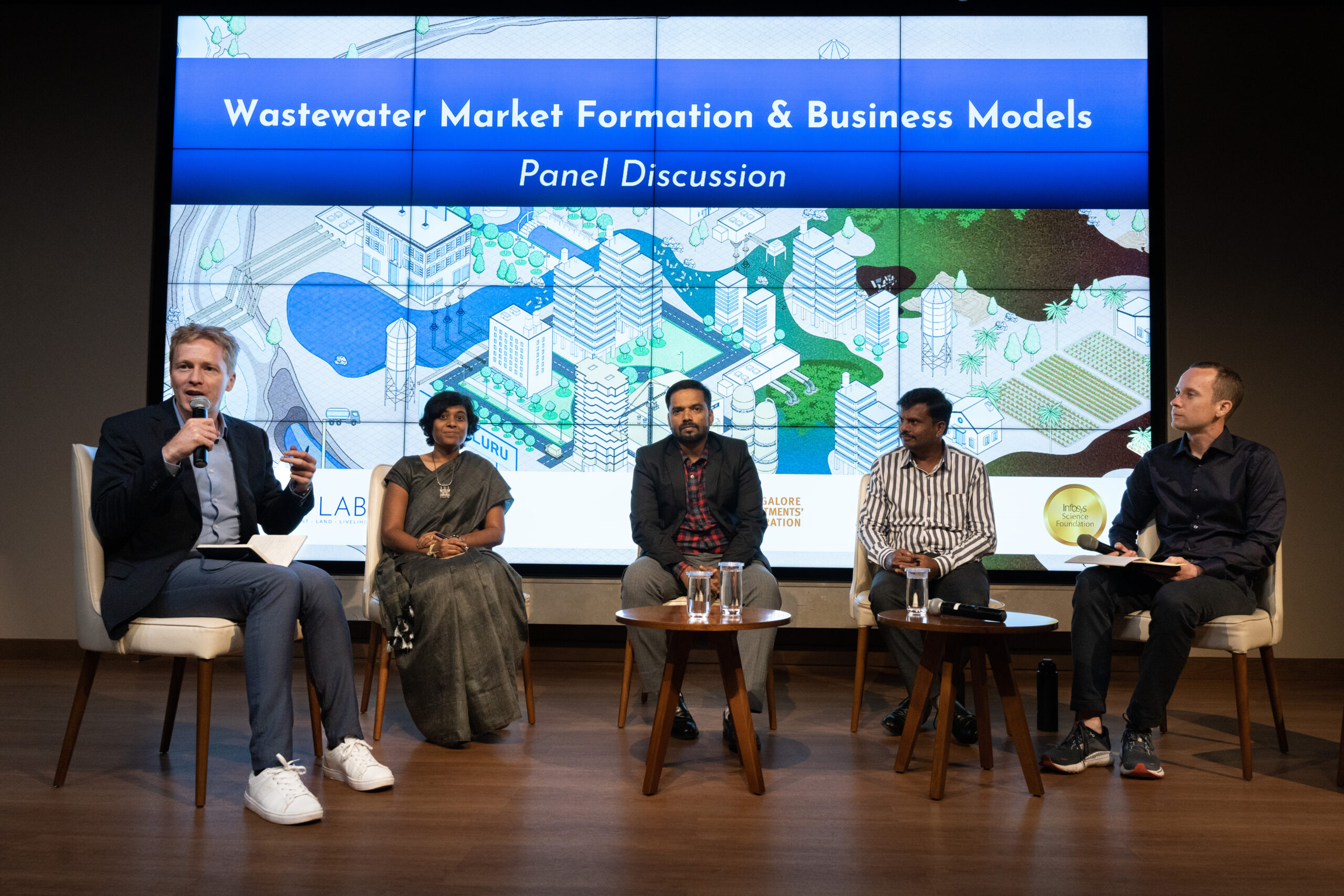
From left: Dr Christian Binz, Ms Moulya Donthi, Mr Vijay Kumar N, Mr Gowthaman Desingh, Dr Johan Miörner discuss wastewater markets and business models.
Ms Donthi also addressed the negative perceptions around the use of wastewater. A core tenet of Tankerwala’s work is the rigorous testing protocol they follow with every tanker of water. This, she says, is essential to convince people that the water is safe to be reused.
Mr. Gowthaman Desingh, Co-founder of BOSON White Water, also highlighted how the supply of and demand for wastewater must be co-located for financial viability. This is why his company has started focusing on industrial belts in Bengaluru, where potential buyers are more closely located.
Builders have emerged as an important part of the coalition to scale up wastewater reuse through the day’s discussions. In fact, Mr. Vijay Kumar N, Deputy General Manager – Environment, Sustainability & ESG at Brigade Group said they have a target to cap carbon emissions and freshwater use.
He also observed that mindsets were changing. ‘We are upfront about our sustainability requirements and how we are working towards achieving them,’ he said.
Find more information about the panellists here.
EAWAG and WELL Labs to work together to conduct a system analysis.
This partnership aims to clarify the opportunities and challenges that exist in terms of scaling up on-site wastewater treatment and reuse solutions. We will also be working together to develop scenarios – how would the water situation change in the city and how would potential solutions fare under different future contexts?
Read | A Visionary Architect and a New Growth Model: What’s Behind the Rise of Sponge Cities in China?
If you would like to collaborate, write to us. We would love to hear from you.
Follow us and stay updated about our work:

